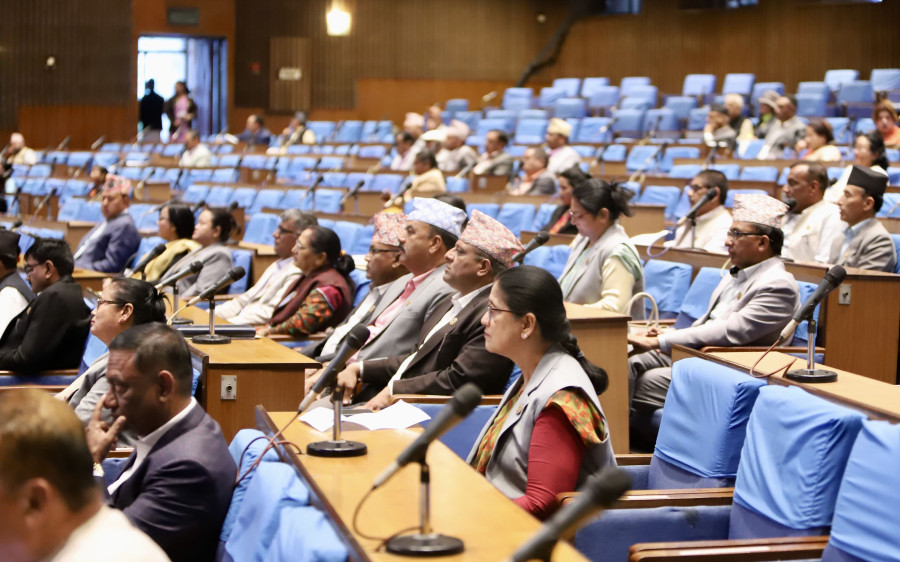Politics
Parliament session busy with budget preparations, crucial legislation
Speaker Ghimire proposes more working days to streamline passage of bills.
Post Report
The government’s policies and programmes will be presented in the federal parliament on May 2, which will be followed by pre-budget discussions.
As per the 15-day calendar for the budget session endorsed on Friday, President Ramchandra Paudel will present the government’s policies and programmes to a joint meeting of the House of Representatives and the National Assembly on May 2. The budget session commenced on Friday.
Discussions over the policy and programme will be held for five days, commencing on May 5.
On May 11, Prime Minister KP Sharma Oli will answer the questions raised over the policies. He will also take questions from lawmakers as part of a regular question-and-answer session the same day, according to the calendar.
Finance Minister Bishnu Prasad Paudel will present the proposal for pre-budget discussions, which will take place over a week from May 13. The national budget will be presented on May 29.
Although deliberations and endorsement of budget-related policies and bills are the priorities of the ongoing House session, several other bills also await approval. Setting the tone for the first day of the session, Speaker Devraj Ghimire said endorsement of the pending bills was necessary to address the voices of discontent as effectively as possible.
He also emphasised the need for collective commitment to concluding the legislative processes required by Parliament.
“The primary responsibility of Parliament is to make laws for the country,” he stated. “To address the voices of discontent that arise due to delays in lawmaking, we must be collectively committed to finalising the necessary legislation as soon as possible.”
Highlighting Parliament as the platform that hears the voices of people’s representatives, Ghimire noted that it serves as a forum for debate on national issues and a venue where decisions are made in line with the people's aspirations. He expressed confidence that the ongoing budget session, starting Friday, will not only address government policies and the national budget but also succeed in passing significant legislation.
He further stated that only by enhancing the effectiveness of Parliament can democratic strengthening, good governance, accountability and the establishment of a responsive governing system be achieved. “Only an effective Parliament can formulate appropriate policies and laws to solve the nation’s problems, and contribute to social justice, economic development, and national prosperity. Therefore, I appeal to all to make the upcoming session a success,” Speaker Ghimire said.
Given the heavy workload of this budget session, the Speaker has initiated efforts to conduct parliamentary meetings on all days except Saturdays and public holidays. This, according to his secretariat, is aimed at concluding deliberations on key bills such as the School Education Bill and the Federal Civil Service Bill. Time has also been allocated in the upcoming parliamentary calendar to advance these important bills, even between discussions on government policies and the national budget, according to the secretariat.
School teachers from across the country are in Kathmandu-centric protests demanding immediate promulgation of the Act. Similarly, non-gazetted civil servants also have warned of agitation demanding the enactment of the Federal Civil Servant Act incorporating their concerns.
Since both bills are currently under consideration of the relevant parliamentary committees, discussions and approval processes in the House have yet to begin. Speaker Ghimire has directed the Parliament Secretariat to schedule the bills for approval immediately after the committees submit their reports.
In discussions held during the meeting of the Business Advisory Committee and consultations with chief whips of major parties, Speaker Ghimire instructed that meetings of the parliamentary committees should continue until critical bills related to constitutional and federal implementation, such as those on education, civil service, and police, are finalised. He also urged that lawmakers avoid scheduling programmes outside the Capital during this period to ensure uninterrupted discussions.




 16.12°C Kathmandu
16.12°C Kathmandu














